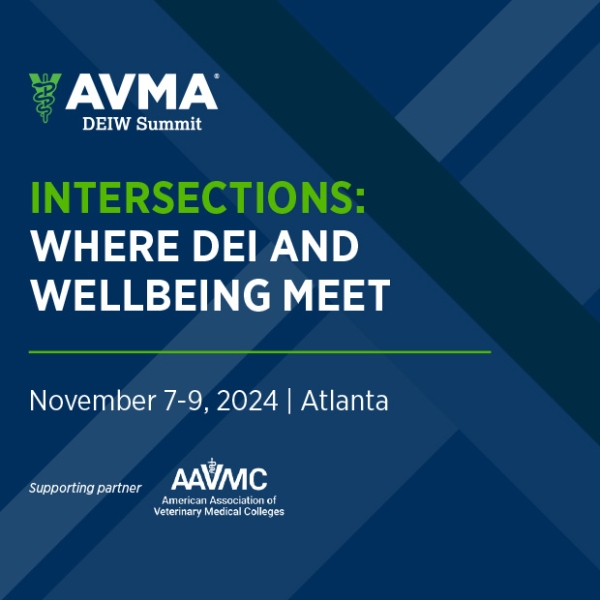Diversity, equity, and inclusion in veterinary medicine

In this article:
- Read about AVMA’s commitment to diversity and inclusion
- Find webinars and podcasts on diversity and related issues
- Discover other resources that support diversity, inclusion, and racial justice

Creating socially conscious educational and work environments—as well as removing barriers to equity and inclusion—are imperatives for veterinary professionals. Veterinarians take an oath to promote public health, and we work in an increasingly diverse world. Veterinarians, team members, and students must be equipped with the knowledge and skills to meet the needs of all clients and create welcoming environments for all co-workers.
Education plays a pivotal role in the pursuit for more diverse and inclusive workplaces. AVMA is committed to providing tools that empower veterinary professionals to advance their education on these issues. From podcasts and CE webinars, to veterinary certificate programs and book lists, these resources may help all veterinary professionals become better allies in support of equitable treatment for all.
Commission promotes diversity, equity, and inclusion
AVMA and the American Association of Veterinary Medical Colleges (AAVMC) have joined forces to drive change with the formation of a commission that leads a coordinated and comprehensive effort to enhance diversity, equity, and inclusion (DEI) in the profession by establishing actionable goals with defined timeframes.
Diversity and inclusion webinars
Diversity and inclusion podcasts
Preventing workplace harassment
Harassment is unwelcome conduct and can create a hostile or offensive work environment, or result in an adverse employment decision such as the victim being fired, demoted, or not promoted. Sexual harassment is a common form of harassment and includes unwelcome sexual advances, requests for sexual favors, and other verbal or physical conduct of a sexual nature. Every member of the veterinary profession can play a role in putting an end to unacceptable workplace behavior.

Certificate programs
Brave Space
Turn your workplace into a safe, healthy, inclusive environment where individual differences aren’t just tolerated, but recognized and valued. The Brave Space Certificate Program is a self-paced, interactive course that helps veterinary professionals gain a deeper understanding of those around us—from team members to clients, patients, and the communities we serve. Give your workplace the information and tools necessary to ensure your team and clients feel included, welcome to express themselves, and valued.
Workplace Wellbeing
Workplace wellbeing means different things to different people and is key to individual and organizational health. Increasing inclusiveness by advancing multicultural competency is a critical component for creating a welcoming environment for all workers. The Workplace Wellbeing Certificate Program empowers all team members to make a difference by developing the knowledge and skills to create a culture of wellbeing in the veterinary workplace.
AVMA policy on diversity and inclusion
The AVMA is committed to diversity and inclusion in all aspects of the profession of veterinary medicine so that we can best serve the animals, the public, and our members. Our goal is to mirror the growing diversity of the communities we serve and to promote an understanding of their varied needs. To this end, we are committed to actively promoting and maintaining diversity and inclusion in our membership, leadership, and organization, and educating our members regarding the value of diversity and inclusion. This commitment embraces the value of the many areas of the veterinary profession, and the value of our members' and their clients' varied backgrounds, including but not limited to race; ethnicity; physical and mental abilities; gender; sexual orientation; gender identity or expression; parental, marital, or pregnancy status; religious or political beliefs; military or veteran status; and geographic, socioeconomic, and educational backgrounds.


